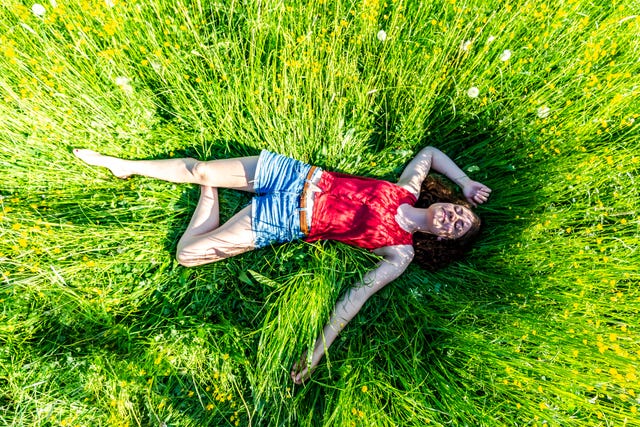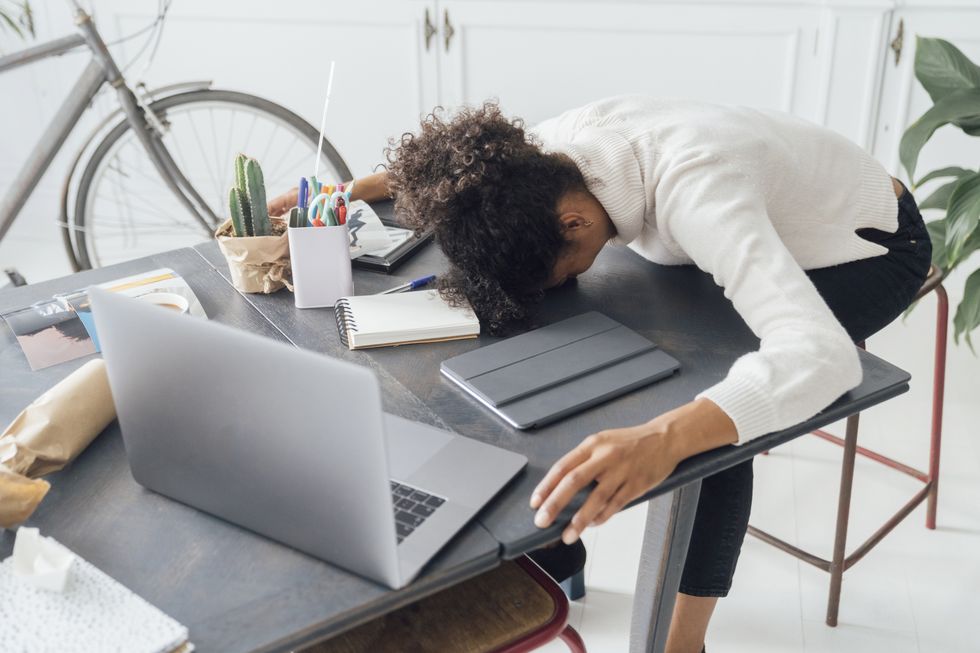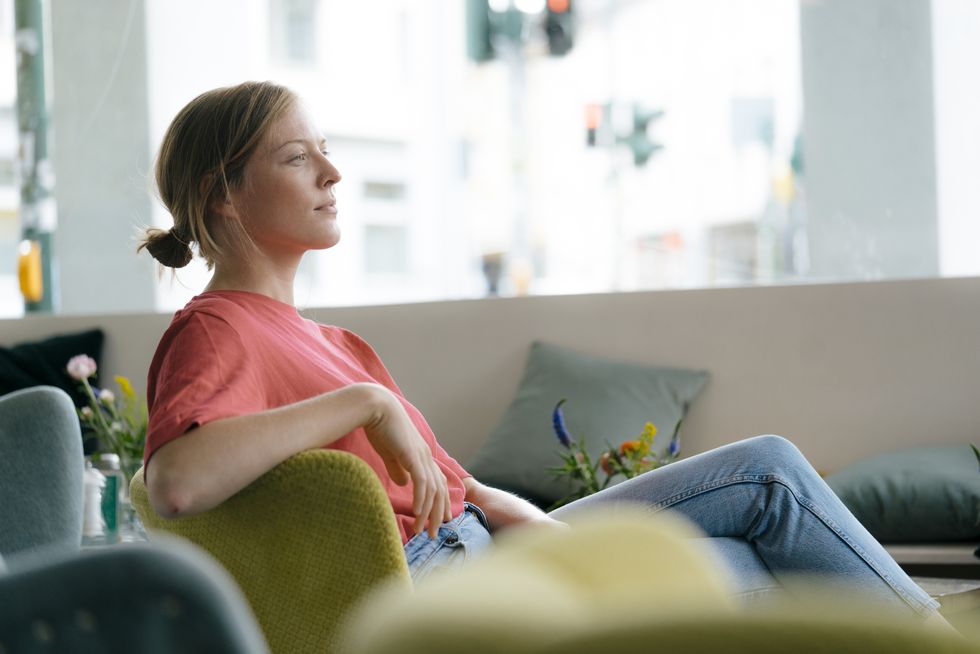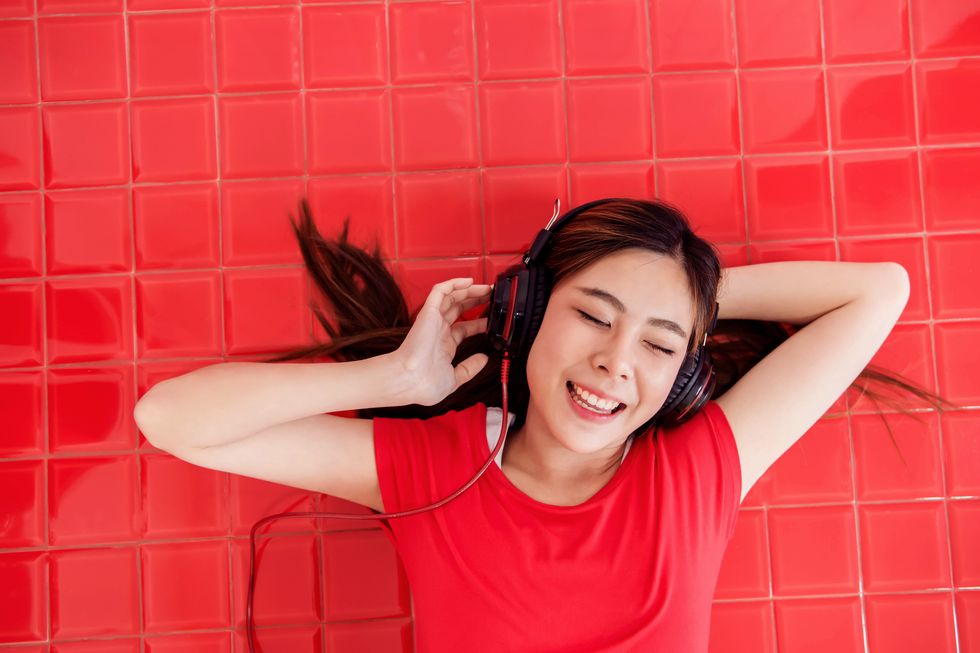In a society that values constant movement and achievement, the act of doing nothing is a radical act of self-care. It’s a conscious choice to prioritize mental well-being, creativity, and meaningful connections. So, the next time you find yourself yearning for a break, consider the beauty and significance of doing nothing – because sometimes, it’s in the moments of stillness that we find the most profound insights and experiences.
Why Doing Nothing is Actually One of the Best Things You Can Do
In a world filled with major stressors and to-do lists, it can be difficult finding time to just do, well, absolutely nothing. But, here’s why you should start.

GETTY IMAGES
When was the last time you did nothing?
By nothing, we mean absolutely nothing — no scrolling social media, no reading books or articles, no listening to podcasts, and no watching movies, TV, or YouTube videos.
Well, if you’re like many Americans, you’ll probably have to stop and think about it, because we don’t “do nothing” very often.
That doesn’t mean we aren’t busy buzzing about the importance of work-life balance and meditation, or busy touting the importance of relaxation — we are. But despite this trend, we’re still busier and more stressed-out than ever.
Even when we’re not working, many of us feel obliged to do something productive, be it going to the gym, running errands, going to a yoga class, or taking care of bills and other duties. We feel obliged to extract productivity out of every last nanosecond from our daily lives, assessing our worthwhileness as human beings by how successful we are in doing so.
And if we’re not busy running around, getting stuff done? Then we feel saddled with guilt.
It’s sad. But it’s not really our fault.
Our culture equates busyness with both high status and moral virtue. Lazing about and relaxing without talking on the phone, checking emails, or consuming books, podcasts, or articles, signals to the world that we aren’t as valuable as those who have a phone that’s blowing up, as intellectually engaged as those who are constantly consuming information, or as virtuous as those who always have their nose to the grindstone.
But buying into these myths can eat away at our sense of self and our overall quality of life. And it certainly can destroy our health, both mental and physical.
“It’s not surprising that rates of depression, anxiety, and stress are increasing as the doingness of life seems to have little counterbalance,” says Sue Smalley, Ph.D.
Smalley is Professor Emeritus in the UCLA Department of Psychiatry and Founder of the UCLA Mindful Awareness Research Center (MARC). She also co-authored the book Fully Present: The Science, Art, and Practice of Mindfulness.
“Science is starting to show the value of spending time in silence, in nature, and in not engaging in constant external stimulation,” she says. “We need time doing ‘nothing’ to be our best selves: well-rounded and creative human beings. The ‘doing’ side of our nature needs a ‘being’ side to be in balance.”
Americans need to take a big chill pill
Sadly, so much of our doingness has resulted from a kind of cultural brainwashing that tells us compulsive busyness is a requisite for being a decent human being and decent employee. As a result, workaholic behaviors like checking your email during off-hours or going into the office on the weekend have become normalized.
“The idea of being immensely productive and of never resting, even if it has its roots in the Protestant work ethic, seems to be at a level that’s unprecedented, especially in the West,” says Brian O’Connor, Ph.D., Full Professor and Head of the School of Philosophy at University College Dublin and author of the 2018 philosophical essay Idleness, published by Princeton University Press.
O’Connor has written numerous op-eds on the importance of idleness and the harmful side effects of hyper-busyness, the deification of work, and constant striving, and he’s made the bold suggestion that all of us might be a bit happier if we stopped obsessively trying to make something of our talents and consciously embraced idleness instead.
It’s a subversive idea that sounds almost sacrilegious, and yet, it might make us happier and more fulfilled in the end. As he points out, many people at the end of their lives don’t regret not working more or not developing themselves and their talents, but rather they regret that they worked so much.
“I think the things that make work significant when people are working — wealth and esteem and competitive advantage — those values seem to drift away a little bit as we get older, and particularly as we get quite old. The wisdom of that age doesn’t support the significance of those drivers.”
Our work culture can certainly be called toxic — just look at the many job postings that list dozens of duties, dozens of prerequisites, and shove three jobs into one position.
“We are a work-consumed society and that has generated guilt and perceptions of laziness if we aren’t working all the time,” says Smalley.
Of course, there’s always a fine balance to strike — doing absolutely nothing, all alone, all the time won’t likely lead to a sense of wellness anymore than constant busyness, at least for most people, and it certainly can be fulfilling to develop our talents. But we’ve made this an absolute imperative and taken it to an extreme, often forgetting that choosing to chill out and do nothing can bring us just as much joy as goal-accomplishment.
O’Connor agrees that it’s worth consciously carving time out of your day to chill for a bit by yourself.
“Any time spent away from the grinding concerns that drive us competitively and productively has to be good,” O’Connor says. “If we regard one of the major challenges today as stress, then anything that reduces stress in a nondestructive way is a good thing.”
We can run from ourselves, but we can’t hide in the end
It’s not just a social pressure to stay busy that keeps so many of us busy — we are also afraid of being with ourselves lest the noise between our ears get too scary.
Idle time can bring on a chattering mind, so aimless mental wandering, though a proven way to boost creativity, innovation, and problem-solving, can potentially lead us to the dark side. This is one reason we so readily reach for the phone or a book or the computer when we do have a chance to slow down.
We don’t want to hear ourselves think.
“There was a study done a number of years ago, where they put people in a room and asked them to just be with themselves, and they were given the option of just sitting by themselves or [electrically] shocking themselves,” says Diana Winston, who co-authored Fully Present with Smalley and is Director of Mindfulness Education at UCLA’s MARC.
“A huge percentage of the people in the study, especially young men, chose to shock themselves over sitting alone with their thoughts,” she says.
Winston is also the author of The Little Book of Being: Practices and guidance for uncovering your natural awareness, and she developed the evidence-based Mindful Awareness Practices (MAPS) curriculum and the Training in Mindfulness Facilitation, which trains mindfulness teachers worldwide.
It’s so important to just sit there and be, without the screen or the book or the podcast blaring in our ears, without “constant cognitive engagement,” as Smalley calls it.
When we do this, we activate something in our brains that neuroscientists call the Default Mode Network (DMN), which allows us to connect new dots and come up with novel ideas and even assess ourselves and psyches in new ways.
“The DMN is thought to play a role in helping us make sense of the experiences we have and the narrative we tell about ourselves,” Smalley says. “In that way, it’s connected to our sense of self.”
You don’t have to be doing nothing to activate the DMN — we accidentally trigger it all the time. Any time you space out and mind-wander during a conversation or a task, you’re tapping into your DMN involuntarily. When we “come to” and realize that our mind has been a million miles away, we typically force our attention back to the conversation or the task at hand.
But if you don’t redirect your mind?
In that case, you can come up with all sorts of new ideas about yourself and the world. Some of the most important philosophers of all time had two things in abundance: idle time and solitude. This allowed them the space to think, to deeply ponder existential questions from all sorts of angles.
You just can’t do that when you’re running yourself into the ground crossing things off your to-do list, or are endlessly glued to a computer screen that has ten or more tabs open.
Of course, not all of us have the privilege and luxury of ample free time, but we can try our best to siphon off just ten or so minutes each day to get quiet.
But some of us need some tools to help us sit quietly by ourselves.
“Mind-wandering is beneficial, important for our self-narratives and likely aspects of creativity, but it can also diminish happiness if you end up thinking about negative events or even neutral ones,” Smalley says.
Here’s how to do nothing without falling down the rabbit hole
If you’re the kind of person who overthinks with too much idle time, you’re not alone.
“I think we need skills on how to be alone with yourself,” Winston says. “Many of us don’t know how to work with our mind. This is where mindfulness and mindfulness education comes in. If I did not have a mindfulness practice and I just sat there, and all I did was I worry, worry, worry, that’s not very nourishing.”
Simply focusing your mind on your breath, and then redirecting it back to your breath when thoughts inevitably pop up — be they negative, positive, or neutral — is one way to practice this. It’s important to suspend any kind of judgment during this process, to be gently awake to what your mind is doing or not doing.
Though mindfulness meditation is slightly different from intentional mind-wandering, it’s still very effective at relieving stress, building, build self-awareness, and boosting creativity and problem-solving.
“Noticing what’s happening in your mind when you are not ‘doing anything’ is a useful step for understanding oneself and your relationship to others and the universe at large,” says Smalley.
If you want a bit of help getting started with mindfulness at home, there are loads of resources out there, including apps. UCLA’s MARC has a free app and also recorded meditations that you can access online.
You can also try the free Insight Timer meditation app or two popular paid apps Headspace and Ten Percent Happier.
Try not to try too hard at doing nothing
One of the reasons meditation in all forms, including mindfulness, has become all the rage is because we are so stressed out and are under so much pressure.
So if you’re not someone who naturally likes to spend idle time in reverie or in meditation, the last thing you need is to add something — doing nothing — to your to-do list, thereby piling on more pressure.
“When you’re trying to do nothing, what I like to call ‘conscious resting’, you put pressure on it and you miss the whole point,” says JoAnna Hardy, one of the founding members of the Meditation Coalition in Los Angeles and a teacher of insight meditation (Vipassana).
“You don’t want it to be something else that you have to check off your schedule so that if you don’t do it you feel bad about yourself.”
But with this in mind, how do you start?
Just ease into the process and do it when it pops in your mind at first instead of scheduling it in every single day. You can also take it easy when you start out.
“You don’t have to sit on a cushion upright and formally meditate to do nothing,” Hardy says.
She mentions the value of just laying on the floor and listening to your favorite music without doing anything else.
“When was the last time you listened to an album from start to finish without doing anything else?”
It’s a good question.
Listening to music doesn’t engage the conscious mind like a TV show or article or podcast, which can give your brain and break, and it also triggers the DMN, just like mind-wandering.
Hardy also reminds us that doing nothing as a means to an end — to boost creativity and productivity, to sort of enhance yourself — defeats the purpose entirely and probably won’t give you the desired result.
“If I’m trying to get myself to fall asleep, it’s that much harder to fall asleep. It’s the same thing if you’re doing nothing. You can’t try at it or look for results.”
So go easy on yourself.
Above all else, remember that it’s not wrong to turn off your to-do list for a day, or even a few days. You’re not a horrible person if you do it, even if it means putting all your obligations on hold, be they to yourself, your boss or client, or your family and friends, as long as they’re not urgent matters.
Trust that you’ll get back to it. Have faith that if you chill for a bit, the whole world won’t come crumbling down. Because the truth is we always have things we could be doing — if you wait until your to-do list or reading list is at zero, you’ll never find a moment to do nothing.
“People feel guilty doing nothing or not being productive, they might think it’s selfish, but taking care of ourselves gives us the capacity to take care of other people,” Winston says. “And if we don’t do it, we burn out. So I like to remind people all the time about how important it is.”
Tracy Chabala’s personal essays and journalism have appeared in the Los Angeles Times, the LA Weekly, VICE, Motherboard, Salon, and other publications. She holds an MFA in Professional Writing from the University of Southern California. Twitter: @TracyAChabala
Discover more from ReviewFitHealth.com
Subscribe to get the latest posts sent to your email.


